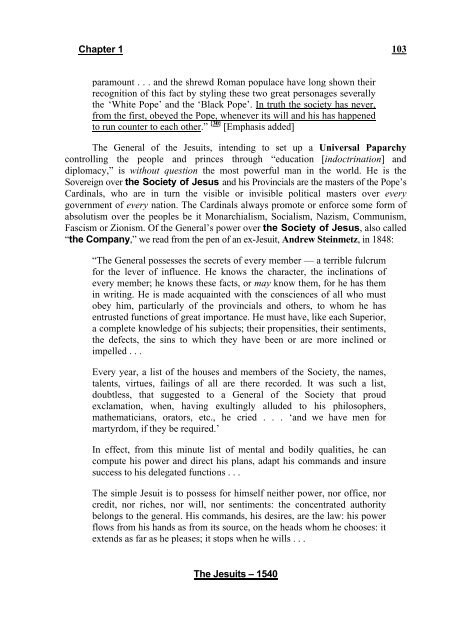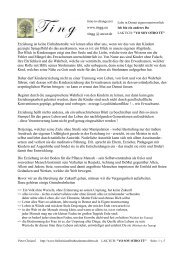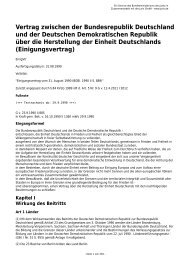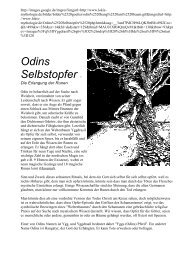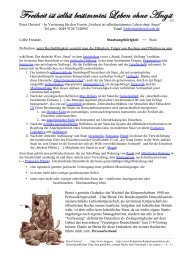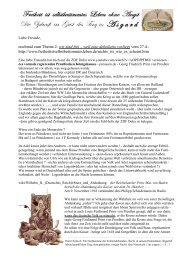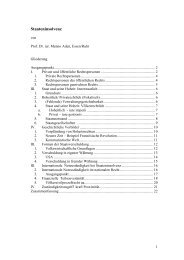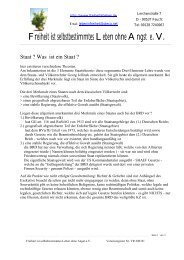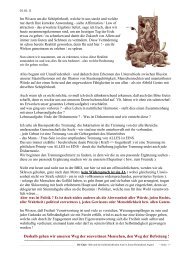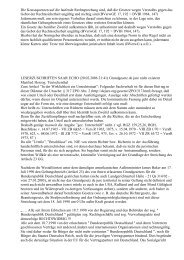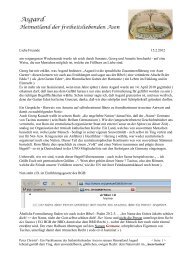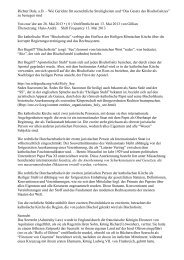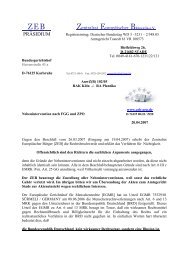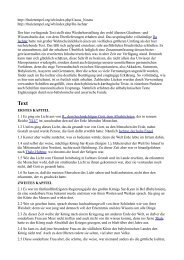- Page 2 and 3: Vatican Assassins: “Wounded In Th
- Page 4 and 5: Table Of Contents 71 Table Of Conte
- Page 6 and 7: Table Of Contents 73 BLOCK II - (17
- Page 8 and 9: Table Of Contents 75 CHAPTER 30…
- Page 10 and 11: Table Of Contents 77 CHAPTER 42….
- Page 12 and 13: Table Of Contents 79 Vatican Assass
- Page 14 and 15: Table Of Contents 81 “IHS” The
- Page 16 and 17: BLOCK I - (1540 - 1773) The Jesuits
- Page 18 and 19: Chapter 1 “The nobility and popul
- Page 20 and 21: Chapter 1 87 Further, “ ‘The po
- Page 22 and 23: Chapter 1 “ ‘But the Jesuits al
- Page 24 and 25: Chapter 1 Protestants, generally to
- Page 26 and 27: Chapter 1 counsels from time to tim
- Page 28 and 29: Chapter 1 95 Ques. From whither do
- Page 30 and 31: Chapter 1 97 That when the same can
- Page 32 and 33: Chapter 1 To take sides with the co
- Page 34 and 35: Chapter 1 “ . . . what other Reli
- Page 38 and 39: Chapter 1 105 and the Greek, the Po
- Page 40 and 41: Chapter 1 107 The Jesuit General’
- Page 42 and 43: Chapter 2 109 “It is under the in
- Page 44 and 45: Chapter 2 111 The Cardinal of Lorra
- Page 46 and 47: Chapter 3 113 “The Bible tells us
- Page 48 and 49: Chapter 3 115 “Scarred, hacked, a
- Page 50 and 51: Chapter 3 117 The Inquisition in Ho
- Page 52 and 53: Chapter 4 119 “In spite of oceans
- Page 54 and 55: Chapter 4 121 ours was lost, many o
- Page 56 and 57: Chapter 4 123 supremacy amongst the
- Page 58 and 59: Chapter 4 125 History would prove t
- Page 60 and 61: Chapter 4 127 Elizabeth I, 1533 - 1
- Page 62 and 63: Chapter 4 129 The Ashbourne Portrai
- Page 64 and 65: Chapter 5 131 “The Catholic Churc
- Page 66 and 67: Chapter 5 133 Henry Garnett, 1606 #
- Page 68 and 69: Chapter 6 135 “Between 1555 and 1
- Page 70 and 71: Chapter 6 137 Assassination of Henr
- Page 72 and 73: Chapter 7 “ . . . a desolating wa
- Page 74 and 75: Chapter 7 141 Silesia, Moravia and
- Page 76 and 77: Chapter 7 143 Death of Gustavus Ado
- Page 78 and 79: PAUSE I 145 and more terrible aspec
- Page 80 and 81: Chapter 8 147 Remembering the purpo
- Page 82 and 83: Chapter 8 149 (Dear truth-seeker, a
- Page 84 and 85: Chapter 8 151 The Righteous Executi
- Page 86 and 87:
Chapter 8 153 Japanese Vice Admiral
- Page 88 and 89:
Chapter 9 155 Having devised the pl
- Page 90 and 91:
Chapter 9 157 (Dear truth seeker, t
- Page 92 and 93:
Chapter 9 159 Knowing that the Soci
- Page 94 and 95:
Chapter 10 161 We are about to acqu
- Page 96 and 97:
Chapter 10 Further, he gave the Ame
- Page 98 and 99:
Chapter 10 165 This honest man of G
- Page 100 and 101:
Chapter 10 167 Although the Jesuits
- Page 102 and 103:
Chapter 11 as I had my desired comm
- Page 104 and 105:
Chapter 11 171 The result of the Re
- Page 106 and 107:
Chapter 11 173 Reading the Revocati
- Page 108 and 109:
Chapter 11 175 Jesuits Torturing th
- Page 110 and 111:
Chapter 12 177 than Communism which
- Page 112 and 113:
Chapter 12 179 “For the Vatican c
- Page 114 and 115:
Chapter 12 181 ‘Most Holy Father:
- Page 116 and 117:
Chapter 12 183 used and would ultim
- Page 118 and 119:
Chapter 12 185 In 1963, God the Fat
- Page 120 and 121:
Chapter 12 187 The Layout of a Redu
- Page 122 and 123:
Chapter 12 189 Marcus Mosiah Garvey
- Page 124 and 125:
Chapter 13 191 neutralize the great
- Page 126 and 127:
Chapter 13 193 (Dear truth-seeker,
- Page 128 and 129:
Chapter 13 and thus were considered
- Page 130 and 131:
Chapter 13 197 English Masonic Knig
- Page 132 and 133:
Chapter 13 199 Jesuit De Smet with
- Page 134 and 135:
Chapter 14 201 “ . . . the Jesuit
- Page 136 and 137:
Chapter 14 203 denounced their doct
- Page 138 and 139:
Chapter 14 205 [Oh, that we would h
- Page 140 and 141:
Chapter 14 207 forced to expel them
- Page 142 and 143:
Chapter 14 209 almost the whole bod
- Page 144 and 145:
Chapter 14 211 “ . . . the Hitler
- Page 146 and 147:
Chapter 14 213 Pope John Paul I, 19
- Page 148 and 149:
PAUSE II The Jesuits - 1773 - 1814
- Page 150 and 151:
PAUSE II 217 “And the sons of str
- Page 152 and 153:
BLOCK II - (1773 - 1814) The Jesuit
- Page 154 and 155:
Chapter 15 221 A key detail here is
- Page 156 and 157:
Chapter 15 223 Catherine II “the
- Page 158 and 159:
Chapter 16 225 The Jesuits, now for
- Page 160 and 161:
Chapter 16 227 Jesuit Adam Weishaup
- Page 162 and 163:
Chapter 17 “When the ‘Declarati
- Page 164 and 165:
Chapter 17 231 Now, the Jesuit Orde
- Page 166 and 167:
Chapter 17 233 Of themselves, the C
- Page 168 and 169:
Chapter 17 235 something else, and
- Page 170 and 171:
Chapter 17 237 Having been baptized
- Page 172 and 173:
Chapter 17 Further, George Washingt
- Page 174 and 175:
Chapter 17 Indeed, “In the winter
- Page 176 and 177:
Chapter 17 243 George Washington, 1
- Page 178 and 179:
Chapter 18 245 “The Jesuits and t
- Page 180 and 181:
Chapter 18 247 “I said so on the
- Page 182 and 183:
Chapter 18 249 “In the summer of
- Page 184 and 185:
Chapter 18 251 Napoleon Bonaparte,
- Page 186 and 187:
Chapter 19 253 The connection betwe
- Page 188 and 189:
Chapter 19 Fra Raymond du Puy intro
- Page 190 and 191:
Chapter 19 friend of the Order, now
- Page 192 and 193:
Chapter 19 The life and activities
- Page 194 and 195:
Chapter 19 261 fascist, absolutist
- Page 196 and 197:
Chapter 19 263 ‘My history of the
- Page 198 and 199:
Chapter 19 265 Fra Andrew Bertie, 2
- Page 200 and 201:
Chapter 19 267 A Hospital of the Kn
- Page 202 and 203:
PAUSE III 269 Jesuits had united un
- Page 204 and 205:
BLOCK III - (1814 - 1914) The Jesui
- Page 206 and 207:
Chapter 20 They can assume any char
- Page 208 and 209:
Chapter 20 only in the speaker but
- Page 210 and 211:
Chapter 20 277 Johannes Philip Root
- Page 212 and 213:
Chapter 21 279 to bring about the d
- Page 214 and 215:
Chapter 21 antipathy. Let us accust
- Page 216 and 217:
Chapter 21 283 united efforts. Prot
- Page 218 and 219:
Chapter 21 285 Thomas Jefferson, 17
- Page 220 and 221:
Chapter 22 287 By the year 1820 the
- Page 222 and 223:
Chapter 22 289 have been allowed to
- Page 224 and 225:
Chapter 22 291 Alexander I, 1777 -
- Page 226 and 227:
Chapter 23 293 Eugene Sue was cut f
- Page 228 and 229:
Chapter 23 295 It was these descrip
- Page 230 and 231:
Chapter 23 297 Abbe Emmanuel Joseph
- Page 232 and 233:
Chapter 24 “The religion of Mason
- Page 234 and 235:
Chapter 24 301 Examples of the Jesu
- Page 236 and 237:
Chapter 24 303 The Jesuits having r
- Page 238 and 239:
Chapter 24 305 instead of bottles,
- Page 240 and 241:
Chapter 24 307 “At what then do t
- Page 242 and 243:
Chapter 24 309 Karl Mordechai Marx,
- Page 244 and 245:
Chapter 24 311 Islamic Freemason Mu
- Page 246 and 247:
Chapter 25 313 That plan was greatl
- Page 248 and 249:
Chapter 25 And what military tactic
- Page 250 and 251:
Chapter 25 317 if he be not submitt
- Page 252 and 253:
Chapter 25 319 Zionist and New York
- Page 254 and 255:
Chapter 26 321 be a mortal sin, the
- Page 256 and 257:
Chapter 26 323 “And what do the p
- Page 258 and 259:
Chapter 26 325 Brotherhood.” And
- Page 260 and 261:
Chapter 26 327 South, particularly
- Page 262 and 263:
Chapter 26 329 “Descendants of Ha
- Page 264 and 265:
Chapter 26 331 the Messiah command
- Page 266 and 267:
Chapter 26 333 that can claim a pla
- Page 268 and 269:
Chapter 26 335 James Buchanan, 1791
- Page 270 and 271:
Chapter 26 337 Benito Pablo Juarez,
- Page 272 and 273:
Chapter 27 “All Catholics should
- Page 274 and 275:
Chapter 27 chooses to reside, by de
- Page 276 and 277:
Chapter 27 343 the rights of its ne
- Page 278 and 279:
Chapter 27 345 respect of the right
- Page 280 and 281:
Chapter 27 347 Alexander H. Stephen
- Page 282 and 283:
Chapter 27 349 Thaddeus Stevens, 17
- Page 284 and 285:
Chapter 28 351 The American bloodba
- Page 286 and 287:
Chapter 28 353 America a nation of
- Page 288 and 289:
Chapter 28 bloody deeds of those tw
- Page 290 and 291:
Chapter 28 promising him protection
- Page 292 and 293:
Chapter 28 359 “Surratt did not o
- Page 294 and 295:
Chapter 28 361 Years later in 1916,
- Page 296 and 297:
Chapter 28 363 John Harrison Surrat
- Page 298 and 299:
Chapter 29 365 “As I have observe
- Page 300 and 301:
Chapter 29 over them. Unless . . .
- Page 302 and 303:
Chapter 29 369 together curse him,
- Page 304 and 305:
Chapter 29 371 Prince Otto von Bism
- Page 306 and 307:
Chapter 30 373 “The Order of Jesu
- Page 308 and 309:
Chapter 30 375 priests at St. Josep
- Page 310 and 311:
Chapter 30 With the defeat of Napol
- Page 312 and 313:
Chapter 30 379 Austria-Hungary was
- Page 314 and 315:
Chapter 30 381 Leon Michael Gambett
- Page 316 and 317:
Chapter 31 “It must be borne in m
- Page 318 and 319:
Chapter 31 385 “The Society of Je
- Page 320 and 321:
Chapter 31 387 It was their plan, a
- Page 322 and 323:
Chapter 31 389 “In 1900 Rome will
- Page 324 and 325:
Chapter 31 391 Theodore Roosevelt,
- Page 326 and 327:
Chapter 32 393 “When Clement XII
- Page 328 and 329:
Chapter 32 395 Alexander III, in co
- Page 330 and 331:
Chapter 32 397 With no man “valia
- Page 332 and 333:
Chapter 32 399 “Between 1932 and
- Page 334 and 335:
Chapter 32 401 Joe P. Grace and Nic
- Page 336 and 337:
Chapter 32 403 “Communism,” use
- Page 338 and 339:
Chapter 32 405 advancement of the G
- Page 340 and 341:
Chapter 32 407 his fellow battlefie
- Page 342 and 343:
Chapter 32 409 Genevieve Brady and
- Page 344 and 345:
Chapter 32 411 Jesuit Coadjutors Ra
- Page 346 and 347:
Chapter 32 413 Georgetown Universit
- Page 348 and 349:
Chapter 32 William Joseph “Wild B
- Page 350 and 351:
Chapter 33 repudiated by every free
- Page 352 and 353:
Chapter 33 419 While in the process
- Page 354 and 355:
Chapter 33 421 God. Blind obedience
- Page 356 and 357:
Chapter 33 423 “The process of de
- Page 358 and 359:
Chapter 33 other capital city in th
- Page 360 and 361:
Chapter 33 427 prominent Protestant
- Page 362 and 363:
Chapter 33 429 “Why do not the ru
- Page 364 and 365:
Chapter 33 431 Mafioso and Italian
- Page 366 and 367:
Chapter 34 433 So here was the inte
- Page 368 and 369:
Chapter 34 of the Knights of Malta
- Page 370 and 371:
Chapter 34 437 Bonaparte - a Freema
- Page 372 and 373:
Chapter 34 439 And because of the J
- Page 374 and 375:
Chapter 34 441 With the authority o
- Page 376 and 377:
Chapter 34 443 Knight of Columbus,
- Page 378 and 379:
Chapter 35 445 “The General posse
- Page 380 and 381:
Chapter 35 “A vacationing priest,
- Page 382 and 383:
Chapter 35 449 with over fifteen hu
- Page 384 and 385:
Chapter 35 So the Jesuit General us
- Page 386 and 387:
Chapter 35 453 most expensive and m
- Page 388 and 389:
Chapter 35 455 William M. Murdoch,
- Page 390 and 391:
Chapter 35 457 Jesuit Provincial of
- Page 392 and 393:
Chapter 36 “The hatred which Euro
- Page 394 and 395:
Chapter 36 461 would it ever be aud
- Page 396 and 397:
Chapter 36 463 Bolshevik Revolution
- Page 398 and 399:
Chapter 36 465 power and that this
- Page 400 and 401:
Chapter 36 467 Shriner Freemason Ed
- Page 402 and 403:
PAUSE IV 469 and all this, it shoul
- Page 404 and 405:
PAUSE IV 471 But in the pursuit of
- Page 406 and 407:
BLOCK IV - (1914 - 2000) The Jesuit
- Page 408 and 409:
Chapter 37 • Destroying Protestan
- Page 410 and 411:
Chapter 37 “Pope Leo XIII gave ev
- Page 412 and 413:
Chapter 37 479 “This man [Adolf H
- Page 414 and 415:
Chapter 37 481 ten million people i
- Page 416 and 417:
Chapter 37 483 Though the great Mex
- Page 418 and 419:
Chapter 37 “I am convinced that t
- Page 420 and 421:
Chapter 37 487 In 1922 1. The Jesui
- Page 422 and 423:
Chapter 37 In 1933 1. The Jesuits,
- Page 424 and 425:
Chapter 37 3. The Jesuits with thei
- Page 426 and 427:
Chapter 37 493 became chaotic. The
- Page 428 and 429:
Chapter 37 Mr. Van Paassen adds fur
- Page 430 and 431:
Chapter 37 497 I will tell you a se
- Page 432 and 433:
Chapter 37 499 4. According to Hein
- Page 434 and 435:
Chapter 37 intelligence agencies ar
- Page 436 and 437:
Chapter 37 who had fought on the si
- Page 438 and 439:
Chapter 37 505 Law, was an act of w
- Page 440 and 441:
Chapter 37 1940 When The British Ex
- Page 442 and 443:
Chapter 37 follies - ‘the blunder
- Page 444 and 445:
Chapter 37 511 This brings us to ou
- Page 446 and 447:
Chapter 37 513 And that the Gentile
- Page 448 and 449:
Chapter 37 515 Yes, dear truth-seek
- Page 450 and 451:
Chapter 37 517 The Papacy’s Conco
- Page 452 and 453:
Chapter 37 519 SS/SD Nazi General W
- Page 454 and 455:
Chapter 37 521 President Roosevelt
- Page 456 and 457:
Chapter 37 523 Harold Macmillan at
- Page 458 and 459:
Chapter 38 525 “The Jesuits are o
- Page 460 and 461:
Chapter 38 527 The Lord Jesus Chris
- Page 462 and 463:
Chapter 38 phony “Cold War” fro
- Page 464 and 465:
Chapter 38 531 of the thirty-five m
- Page 466 and 467:
Chapter 38 533 The Jesuits, in buil
- Page 468 and 469:
Chapter 38 535 loyal to his Jesuit
- Page 470 and 471:
Chapter 38 537 of Amtorg, the tradi
- Page 472 and 473:
Chapter 38 539 Israelites to enter
- Page 474 and 475:
Chapter 38 541 One of the prime rea
- Page 476 and 477:
Chapter 38 “Both the CIA and Gehl
- Page 478 and 479:
Chapter 38 545 The Cold War of attr
- Page 480 and 481:
Chapter 38 547 Jean-Baptiste Jansse
- Page 482 and 483:
Chapter 38 549 General Prince Anton
- Page 484 and 485:
Chapter 38 551 Knight of Malta Jame
- Page 486 and 487:
Chapter 39 553 After the Second Thi
- Page 488 and 489:
Chapter 39 555 Knight of Columbus b
- Page 490 and 491:
Chapter 39 557 In this terrorizatio
- Page 492 and 493:
Chapter 39 559 growing U.S. market
- Page 494 and 495:
Chapter 39 561 Cardinal Spellman, V
- Page 496 and 497:
Chapter 39 563 “Spelly’s War”
- Page 498 and 499:
Chapter 40 565 “The Cold War” b
- Page 500 and 501:
Chapter 40 was far more valuable th
- Page 502 and 503:
Chapter 40 569 Dolores, also Jesuit
- Page 504 and 505:
Chapter 40 Further, “During and a
- Page 506 and 507:
Chapter 40 573 been commercially sa
- Page 508 and 509:
Chapter 40 575 Shriner Freemason Al
- Page 510 and 511:
Chapter 41 In pursuing Rome’s que
- Page 512 and 513:
Chapter 41 579 President Lyndon Joh
- Page 514 and 515:
Chapter 42 “Woe to all who found
- Page 516 and 517:
Chapter 42 particularly in the pers
- Page 518 and 519:
Chapter 42 15. Gerald Coughlin - Ke
- Page 520 and 521:
Chapter 42 587 Spellman turned to h
- Page 522 and 523:
Chapter 42 589 Knight of Malta Thom
- Page 524 and 525:
Chapter 43 591 Communist Negro agit
- Page 526 and 527:
Chapter 43 593 Dear truth-seeker, t
- Page 528 and 529:
Chapter 43 595 Jesuit Priest John L
- Page 530 and 531:
Chapter 44 “It is of faith that t
- Page 532 and 533:
Chapter 44 “Kennedy . . . was mur
- Page 534 and 535:
Chapter 44 Jim Garrison clearly pro
- Page 536 and 537:
Chapter 44 603 The author knows the
- Page 538 and 539:
Chapter 44 605 For he “ . . . [sh
- Page 540 and 541:
Chapter 44 607 Presidential Candida
- Page 542 and 543:
Chapter 44 609 Knight of Malta, Wil
- Page 544 and 545:
Chapter 44 611 Alexander M. Haig, J
- Page 546 and 547:
Chapter 44 613 Francis Cardinal Spe
- Page 548 and 549:
Chapter 45 615 Cardinal Spellman’
- Page 550 and 551:
Chapter 45 617 Roman Catholic Knigh
- Page 552 and 553:
Chapter 46 “Who are they [the Jes
- Page 554 and 555:
Chapter 46 621 Mob used anything bu
- Page 556 and 557:
Chapter 46 623 same great power wie
- Page 558 and 559:
Chapter 46 DeLoach reported that Fo
- Page 560 and 561:
Chapter 46 playwright, internationa
- Page 562 and 563:
Chapter 46 629 Jesuit John Courtney
- Page 564 and 565:
Chapter 46 631 Jesuit Father Under
- Page 566 and 567:
Chapter 46 633 Brother Oliver Stone
- Page 568 and 569:
Chapter 47 635 tyranny and personal
- Page 570 and 571:
Chapter 47 Could this have been the
- Page 572 and 573:
Chapter 47 639 Tzar of the 1970’s
- Page 574 and 575:
Chapter 47 641 Papal Knight Thomas
- Page 576 and 577:
Chapter 48 “ . . . and while they
- Page 578 and 579:
Chapter 48 president of that period
- Page 580 and 581:
Chapter 48 “We see Rome’s satan
- Page 582 and 583:
Chapter 48 649 “At the request of
- Page 584 and 585:
Chapter 48 651 Since the destructio
- Page 586 and 587:
Chapter 48 653 at a salary of $32,0
- Page 588 and 589:
Chapter 48 655 Jesuit John McLaughl
- Page 590 and 591:
Chapter 48 657 President Nixon, SEC
- Page 592 and 593:
Chapter 48 659 FBI Officer Robert P
- Page 594 and 595:
Chapter 48 661 Presidential Candida
- Page 596 and 597:
Chapter 49 “The Jesuits awed Case
- Page 598 and 599:
Chapter 49 severely limiting exempt
- Page 600 and 601:
Chapter 49 “Though polio vaccines
- Page 602 and 603:
Chapter 49 In place of proven cures
- Page 604 and 605:
Chapter 49 Dear truth-seeker, accor
- Page 606 and 607:
Chapter 49 673 New York City: The P
- Page 608 and 609:
Chapter 50 And these things I do pl
- Page 610 and 611:
Chapter 50 677 The Fourteenth Amend
- Page 612 and 613:
Chapter 50 679 has been, the heart
- Page 614 and 615:
Chapter 50 681 This will ultimately
- Page 616 and 617:
Chapter 50 683 The Black Pope, Pete
- Page 618 and 619:
Conclusion 685 “Princes and perso
- Page 620 and 621:
Conclusion 687 With the dilemma tha
- Page 622 and 623:
Conclusion 689 which are the causes
- Page 624 and 625:
Conclusion 691 12. Sheepishly givin
- Page 626 and 627:
Conclusion 693 the zeal of Nehemiah
- Page 628 and 629:
Conclusion 695 she has desired secu
- Page 630 and 631:
Conclusion 697 Upon His return, He
- Page 632 and 633:
Conclusion 699 John F. Kennedy, Jr.
- Page 634 and 635:
Appendix I IRS - Internal Revenue S
- Page 636 and 637:
Appendix II 703 Chapter 26 - Nehemi
- Page 638 and 639:
Appendix III 705 30. The Time of Ja
- Page 640 and 641:
Appendix III 707 28. Ibid, 492, 493
- Page 642 and 643:
Appendix III 709 7. Ridpath’s Uni
- Page 644 and 645:
Appendix III 711 2. The Life of Hor
- Page 646 and 647:
Appendix III 713 20. The Life of Ge
- Page 648 and 649:
Appendix III 715 12. The Jesuits, I
- Page 650 and 651:
Appendix III 717 9. The Assassinati
- Page 652 and 653:
Appendix III 719 21. The Jesuits: T
- Page 654 and 655:
Appendix III 721 6. The Vatican Aga
- Page 656 and 657:
Appendix III 723 59. The Suppressed
- Page 658 and 659:
Appendix III 725 4. Vietnam: Why Di
- Page 660 and 661:
Appendix III 727 17. JFK: The Dead
- Page 662 and 663:
Appendix III 729 10. Ibid, p. 39. 1


